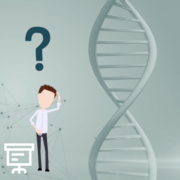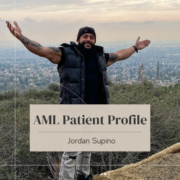What is Targeted AML Therapy?
AML expert, Dr. Jessica Altman, defines targeted AML therapy and outlines available treatment options. Want to learn more? Download the Program Resource Guide here.
Dr. Jessica Altman is Director of the Acute Leukemia Program at Robert H. Lurie Comprehensive Cancer Center of Northwestern University.
See More From The Fact or Fiction? AML Series
Related Resources

|

|

|
Transcript:
Patricia:
Can you talk a little bit about targeted therapy?
Dr. Altman:
Absolutely. So, targeted therapy – while meant to be specific, because a target is meant to be specific – targeted therapy has become a relatively broad characterization of additional treatments. We think about targeted therapy as the addition of agents that specifically inhibit or target an abnormality associated with the leukemia. The most prominent targeted therapies right now involve specific mutations seen in Acute Myeloid Leukemia.
For instance, about 30% of adults who have newly diagnosed AML will have a mutation in something called FLT3, or F-L-T-3. There is now an approved drug that is combined with standard intensive induction chemotherapy that improves the
response rate and overall survival in adults with AML with a FLT3 mutation. In addition, there is now an approved agent for relapsed and refractory FLT3 mutating leukemia.
Patricia:
What about molecular testing? What can you say about that?
Dr. Altman:
Molecular testing is part of the workup for an adult or a child when they’re newly diagnosed Acute Myeloid Leukemia. And molecular abnormalities look for specific known mutations that occur in Acute Myeloid Leukemia cells.
For instance, that FLT3 that I mentioned. In addition, the IDH mutation. Looking for those mutations has always been important in understanding the prognosis, but it’s now especially important because some specific mutations, we have additional therapies that we can give as part of initial treatment or for relapsed disease that target those mutations. So, not only do they have a prognostic role, but they have a treatment impact as well.






![[ACT]IVATED AML Resource Guide [ACT]IVATED AML Resource Guide](https://powerfulpatients.org/wp-content/uploads/ACTIVATED-AML-Resource-Guide-180x180.png)



